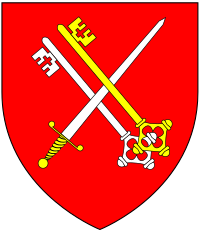Bishop of Winchester | |
|---|---|
| Bishopric | |
| anglican | |
 Arms of the Bishop of Winchester: Gules, two keys addorsed in bend the upper or the lower argent between them overlying the uppermost key a sword in bend sinister point upright of the third hilt and pommel or[1] | |
| Incumbent: Philip Mounstephen | |
| Location | |
| Ecclesiastical province | Canterbury |
| Residence | Wolvesey Palace, Winchester |
| Information | |
| First holder | Wine |
| Established | 634 (at Dorchester) 660 (translated to Winchester) |
| Diocese | Winchester |
| Cathedral | Winchester Cathedral (since 660) Dorchester (634–660) |
The Bishop of Winchester is the diocesan bishop of the Diocese of Winchester in the Church of England. The bishop's seat (cathedra) is at Winchester Cathedral in Hampshire.
The Bishop of Winchester has always held ex officio the office of Prelate of the Most Noble Order of the Garter since its foundation in 1348. except during the period of the Commonwealth until the Restoration of the Monarchy.[2] Bishops of Winchester also often held the positions of Lord Treasurer and Lord Chancellor ex officio.
During the Middle Ages, the Diocese of Winchester was one of the wealthiest English sees, and its bishops have included a number of politically prominent Englishmen, notably the 9th century Saint Swithun and medieval magnates including William of Wykeham and Henry of Blois.
The Bishop of Winchester is appointed by the Crown, and is one of five Church of England bishops who sit ex officio among the 26 Lords Spiritual in the House of Lords, regardless of their length of service.[3] Philip Mounstephen has been the Bishop of Winchester since 10 October 2023.[4][5]
The Diocese of Winchester is one of the oldest and most important in England. Originally it was the episcopal see of the kingdom of Wessex or the West Saxons, with its cathedra at Dorchester Cathedral near Oxford under Saints Birinus and Agilbert. The cathedral at Dorchester was founded in AD 634 by Birinius, a Roman missionary. The see was transferred to Winchester in AD 660.
Winchester was divided in AD 909, with Wiltshire and Berkshire transferring to the new See of Ramsbury. Nevertheless, the domains of the Bishop of Winchester ran from the south coast to the south bank of the River Thames at Southwark, where the bishop had one of his palaces, making it one of the largest as well as one of the richest sees in the land. In more modern times, the former extent of the Diocese of Winchester was reduced by the formation of a new diocese of Southwark in south London,[a] a new diocese of Guildford in Surrey and a new diocese of Portsmouth in Hampshire. The most recent loss of territory was in 2022 when the Channel Islands were removed from the diocese of Winchester after a dispute with Bishop Tim Dakin led to a breakdown in relations. The Channel Islands were transferred to the Diocese of Salisbury by an Order in Council made under the Channel Islands Measure 2020.[7]
Traditionally, in the general order of precedence before 1533, the Bishop of Winchester was given precedence over all other diocesan bishops - that is, the first English bishop in rank behind the archbishops of Canterbury and York. But in 1533, Henry VIII of England raised the rank of the Bishop of London and the Bishop of Durham, relegating Winchester to third (but still above other remaining diocesan bishops).[citation needed] The order of precedence was implicitly recognised by the Bishoprics Act 1878.[8][b]
The Report of the Commissioners appointed by his Majesty to inquire into the Ecclesiastical Revenues of England and Wales (1835) found the Winchester see was the third wealthiest in England, after Canterbury and London, with an annual net income of £11,151.[9]
The official residence of the Bishop of Winchester is Wolvesey Palace in Winchester. Historic homes of the bishops included Wolvesey Castle, Farnham Castle, Bishop's Waltham Palace and Winchester Palace in Southwark. The bishop is the visitor to five Oxford colleges, namely Magdalen College, New College, St John's College, Trinity College, and Corpus Christi College.
- ^ Debrett's Peerage, 1968, p.1160, as depicted there, expanded for clarity
- ^ Charles Dodd (1844) Manual of Dignities, from the Revolution to the Present Day p.45
- ^ "Lords Spiritual". The Church of England in Parliament. 26 February 2014. Retrieved 2 September 2020.
- ^ "(section: Forthcoming Events)". St Mary-le-Bow. Archived from the original on 10 October 2023. Retrieved 10 October 2023.
- ^ @BishopAngaelos (10 October 2023). "A joy to be at back at @BowBellsChurch for Confirmation of Election..." (Tweet). Archived from the original on 11 October 2023 – via Twitter.
- ^ "No. 27777". The London Gazette. 21 March 1905. p. 2169.
- ^ "Ink dries at last on transfer of Jersey deanery to Salisbury diocese".
- ^ "Bishoprics Act 1878, s. 5". Legislation.gov.uk. Retrieved 21 June 2021.
- ^ The National Cyclopaedia of Useful Knowledge Vol.III, London, Charles Knight, 1847, p.362
Cite error: There are <ref group=lower-alpha> tags or {{efn}} templates on this page, but the references will not show without a {{reflist|group=lower-alpha}} template or {{notelist}} template (see the help page).